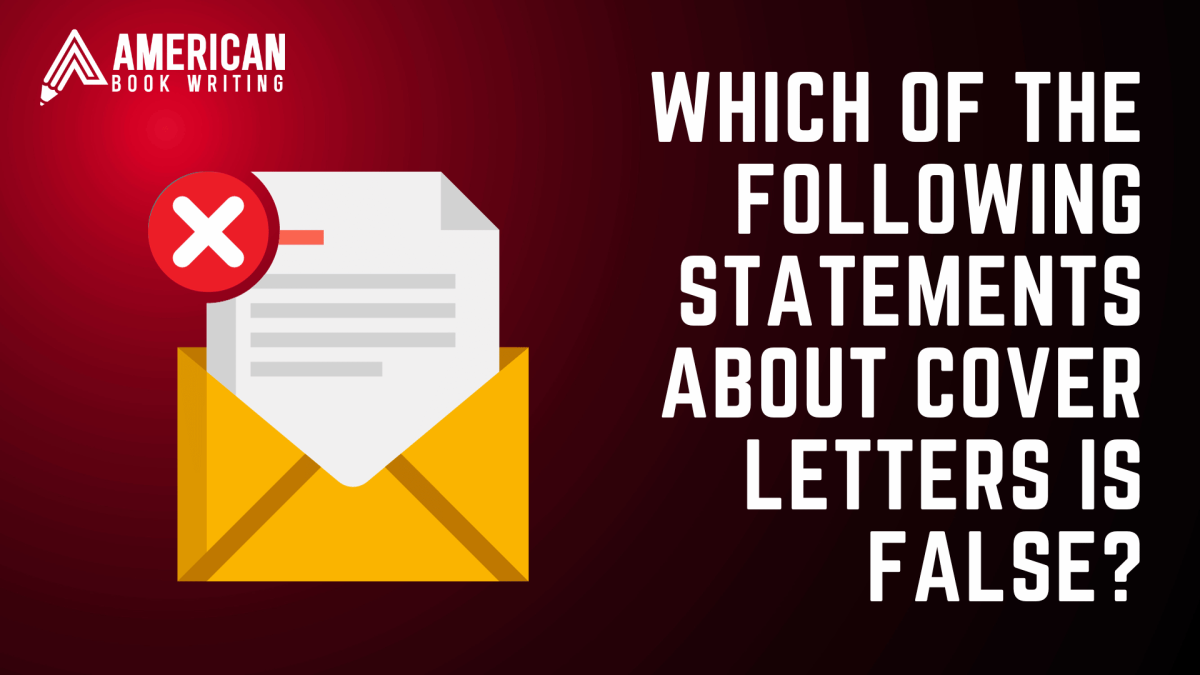Cover Letter
Press The Play Button On The Audio To Listen Complete Article!
Cover letters often find themselves at the center of many myths and misconceptions. And some false statements about cover letters are rampant in the world of cover letter writing.
If you Google something like “myths about cover letters,” you will find many articles about bad advice. What makes some ebook writers so desperate for attention that they spread misinformation? Also, what makes job seekers so gullible to trust these sources?
In this blog, we’re here to debunk the false statements about cover letters and provide you with valuable insights into crafting effective cover letters. From the belief that they’re irrelevant to the misconception that shorter is always better, we’ll explore the truths and falsehoods surrounding cover letters.
By the end of this journey, you’ll clearly understand how to make your cover letter an asset rather than a hindrance in your job search.
The Myth of Irrelevance:
One of the most prevalent false statements about cover letters is the belief that they are irrelevant in today’s job market. Some argue that hiring managers don’t read them or that they simply repeat information from the resume.
This couldn’t be further from the truth. A well-crafted cover letter can be your secret weapon, setting you apart from other candidates. It’s your opportunity to connect with the employer on a personal level and tell your unique story.
The Copy-Paste Conundrum:
Another false statement is that you can create a single cover letter and use it for all job applications. Understanding that a generic cover letter won’t cut it is essential.
Each job and company is unique; your cover letter should reflect this. Tailor your letter to the specific job, mentioning the company and job title.
Highlight how your skills and experiences align with the role’s requirements. Generic cover letters often end up in the rejection pile.
The Length Dilemma:
Some believe a short cover letter is better, as hiring managers or a book publishing company don’t have time to read lengthy documents. While it’s true that brevity is essential, it doesn’t mean you should skimp on content.
A concise cover letter succinctly conveys your qualifications and enthusiasm for the job is ideal. However, overly short letters may come across as disinterested. Aim for a balance that gets your message across without overwhelming the reader.
The All About Me Trap:
One false statement is that cover letters should focus solely on the applicant. While it’s important to highlight your qualifications, the focus should be on how you can contribute to the company.
Employers seek candidates who can meet their needs and solve their problems. A cover letter should demonstrate your understanding of the company’s goals and how you can help achieve them.
The Fluff and Jargon Fallacy:
Some believe that using buzzwords and industry jargon like “B2B copywriting”, “internal linking, “etc., in a cover letter will impress hiring managers.
However, this can have the opposite effect. Using too much jargon can make your letter less accessible and may come across as insincere.
Instead, strive for clarity and authenticity in your language. Explain your skills and experiences in a way that anyone, regardless of their familiarity with the industry, can understand.
The Absence of Errors Assumption:
It’s a false statement to assume that your cover letter is error-free just because you’ve given it a quick read. Proofreading is critical because typos, grammatical errors, or factual inaccuracies can instantly disqualify your application. Take the time to review your cover letter carefully, or even better, ask someone else to proofread it for you. It can be a friend or family or a book writing services provider who is professional enough to go over it.
Your cover letter is like your written handshake, showcasing your communication skills and ability to provide precise information. Mistakes send the opposite message –you might not pay attention to details or lack the skills needed for the job.
To avoid this assumption, take the time to carefully review your cover letter. Go beyond a quick look and delve into thorough proofreading. Check for spelling and grammar mistakes, ensure your sentences make sense, and verify facts like dates or numbers.
The Instant Response Misconception:
Another common myth is that you should expect an immediate response once you send your application. The reality is that the hiring process takes time, and employers receive numerous applications.
Patience is key, so don’t be discouraged if you don’t hear back immediately. Follow up politely after a reasonable time to express your continued interest.
A heads up to the employer:
One common but misguided belief is that a cover letter is a heads-up to the employer, letting them know a resume is on the way. In reality, a cover letter is much more than a mere prelude to your resume; it’s your introduction to the prospective employer, your first chance to create an impactful impression.
As the saying goes, “First impressions are lasting impressions,” and a cover letter embodies this principle professionally. It’s the initial glimpse into your professional identity and should be crafted with precision, conciseness, and charisma.
Not your resume’s Duplicate:
Let’s clear the air on what a cover letter isn’t. It’s not a duplicate of your resume. Instead, it delves into specific details about your professional experiences and provides context for gaps in your work history. It’s your opportunity to explain your motivations for seeking a new role and showcase your ideal fit for the position.
A compelling cover letter often serves as the key to unlocking job opportunities. It highlights your suitability for the role and outlines how your qualifications align with the job requirements. A well-crafted cover letter is your advocate, conveying to the employer why you’re the perfect candidate for the position.
In contrast to the myth, a cover letter isn’t a comprehensive dossier of your professional history. Instead, it’s a strategic tool to make a memorable entrance into the world of job applications.
Conclusion:
Any type of cover letter is far from irrelevant, as they are a valuable tool for making a strong first impression and showcasing your suitability for a job.
Avoid these false statements about cover letters, and remember that a well-tailored, error-free, and engaging cover letter can make all the difference in your job search. It’s your chance to tell your story, connect with potential employers, and stand out in the competitive world of job applications.
So, give your cover letter the attention it deserves and make it a key part of your job-seeking strategy.




